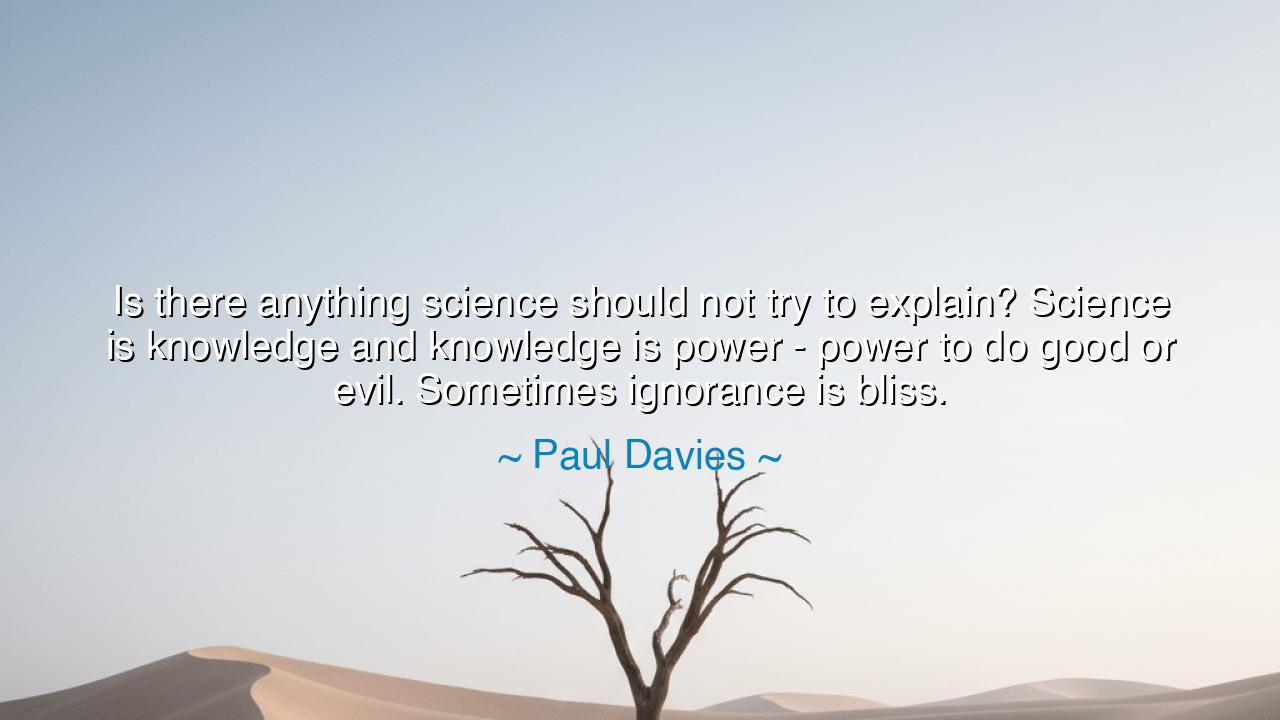
Is there anything science should not try to explain? Science is
Is there anything science should not try to explain? Science is knowledge and knowledge is power - power to do good or evil. Sometimes ignorance is bliss.






“Is there anything science should not try to explain? Science is knowledge and knowledge is power — power to do good or evil. Sometimes ignorance is bliss.” — Paul Davies
In this haunting and contemplative reflection, Paul Davies, the physicist and philosopher of the cosmos, confronts one of the deepest questions of human destiny — whether there are boundaries to knowledge, and whether the pursuit of science must be tempered by the wisdom of restraint. His words are both a warning and a wonder. He recognizes that science, the shining flame of inquiry, gives humanity immense power — to heal, to create, to illuminate, but also to destroy. He reminds us that knowledge is not neutral; it carries within it the dual potential of good and evil. And in that recognition lies a paradox older than civilization itself: that there are truths so potent, they can either uplift or unravel the world that discovers them.
The origin of this thought lies in the eternal tension between curiosity and conscience. From the dawn of human thought, man has looked to the heavens and asked, “Why?” The quest to understand — to explain the mysteries of nature, of life, of death itself — is woven into our very soul. Yet, as Davies warns, this quest carries a shadow. For knowledge is not merely enlightenment; it is also power, and power, without moral guidance, can become perilous. His question, “Is there anything science should not try to explain?” is not a rejection of discovery, but a call to humility — a reminder that not every truth serves humanity well when divorced from wisdom, compassion, and moral responsibility.
This truth is written across the story of our species. Consider the tale of Prometheus, who stole fire from the gods and gave it to mankind. His act was both noble and catastrophic — it gave rise to civilization, but also to destruction. Fire, like knowledge, is neither good nor evil; it is the will of those who wield it that determines its outcome. The myth of Prometheus is echoed in the story of modern science — in Oppenheimer, who harnessed the atom, and in the countless innovators who have opened doors without fully knowing what lies beyond them. The light of knowledge is bright, but it casts long shadows.
In the twentieth century, this paradox reached its fiercest form. The scientists of the Manhattan Project sought to understand the deepest secrets of the universe — the forces that bind the stars themselves. They succeeded — and in doing so, they gave humanity the power to annihilate itself. As the first atomic bomb burst into light over the desert, Oppenheimer recalled the words of the Bhagavad Gita: “Now I am become Death, the destroyer of worlds.” This was the moment when mankind first saw the full, terrible weight of knowledge ungoverned by wisdom. What had begun as curiosity ended in horror. And so, the world learned, too late, that science can indeed explain anything — but that some explanations demand the strength of the soul to endure.
Davies’ final phrase, “Sometimes ignorance is bliss,” carries a bittersweet truth. It does not praise blindness, but speaks to the burden of awareness. To know is to awaken; to awaken is to see both the beauty and the terror of existence. There are mysteries — of death, of consciousness, of creation — that may reveal truths too vast, too terrible, for the unready heart. Yet, the wise do not use this as an excuse to stop seeking; rather, they remember that every revelation must be matched with responsibility. The mind must advance, yes, but the heart must keep pace.
Thus, Davies calls us not to abandon science, but to sanctify it. He asks us to remember that knowledge without wisdom is like a sword in the hands of a child. It may glitter, but it kills without understanding. Every discovery, every experiment, every question answered must be weighed against its consequence. Power is not evil in itself — it is the mirror of the soul that wields it. When guided by love, knowledge heals the sick, feeds the hungry, and lifts the spirit of man. When driven by greed, it corrupts, divides, and destroys. The true measure of progress, therefore, is not what we can explain, but what we are wise enough to handle.
So, my listener, take this lesson into your heart: seek knowledge, but seek also virtue. Ask not only “What can we do?” but “What should we do?” Let your curiosity be tempered by compassion, your intellect guided by conscience. Remember that every act of understanding carries the weight of choice — the choice to use knowledge for creation or for ruin. The light of science must be held not in the hands of pride, but in the heart of humility. For when man forgets this balance, his greatest discoveries become his greatest dangers.
And thus, the words of Paul Davies echo as both warning and hope: “Science is knowledge, and knowledge is power — power to do good or evil.” If we would survive, if we would flourish, we must learn not merely to know, but to understand; not merely to explain, but to revere. For the true purpose of knowledge is not domination, but harmony — to see the divine in creation, and to use our power not to conquer the world, but to make it whole.






AAdministratorAdministrator
Welcome, honored guests. Please leave a comment, we will respond soon